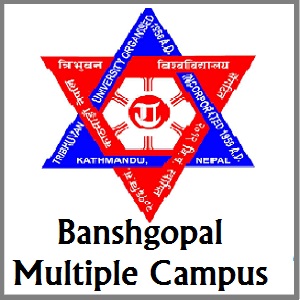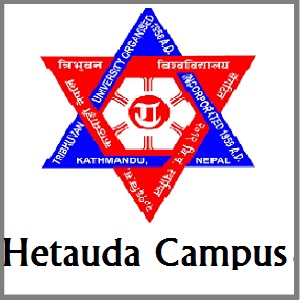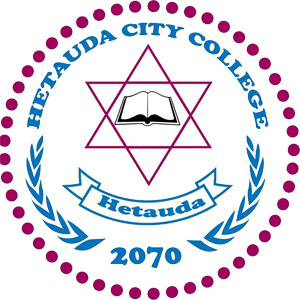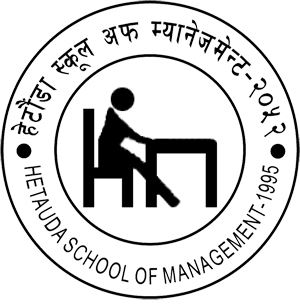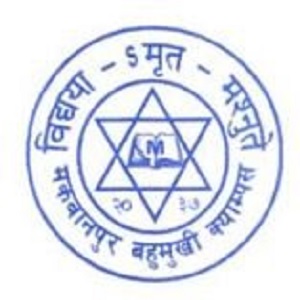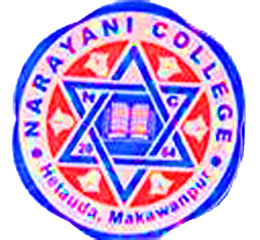Overview
Palung Multiple Campus, located in the scenic valley of Khelpudanda, Thaha Municipality, Ward No. 3, Makwanpur, has been operating since Bhadra 5, 2060 BS, under affiliation with Tribhuvan University. It is the only community campus in the northern region of Makwanpur District or Thaha Municipality. It offers TU-affiliated BBS (Accountancy, Finance, and Marketing) and BA (English, Nepali, Sociology, and Economics) Programs.
The foundation for higher education in this area began in 2053 BS through an extended program of Makwanpur Multiple Campus named "Makwanpur Multiple Campus Extended Program Palung," offering proficiency certificate-level courses in Management and Humanities.
The formal establishment of Palung Bahumukhi Campus as an autonomous institution took place in 2060 BS. Initially operated from Ghattichaur until 2065 BS, the campus now runs from its current location and building.
The campus is committed to academic excellence, social responsibility, and quality education through equitable access and updated learning resources.
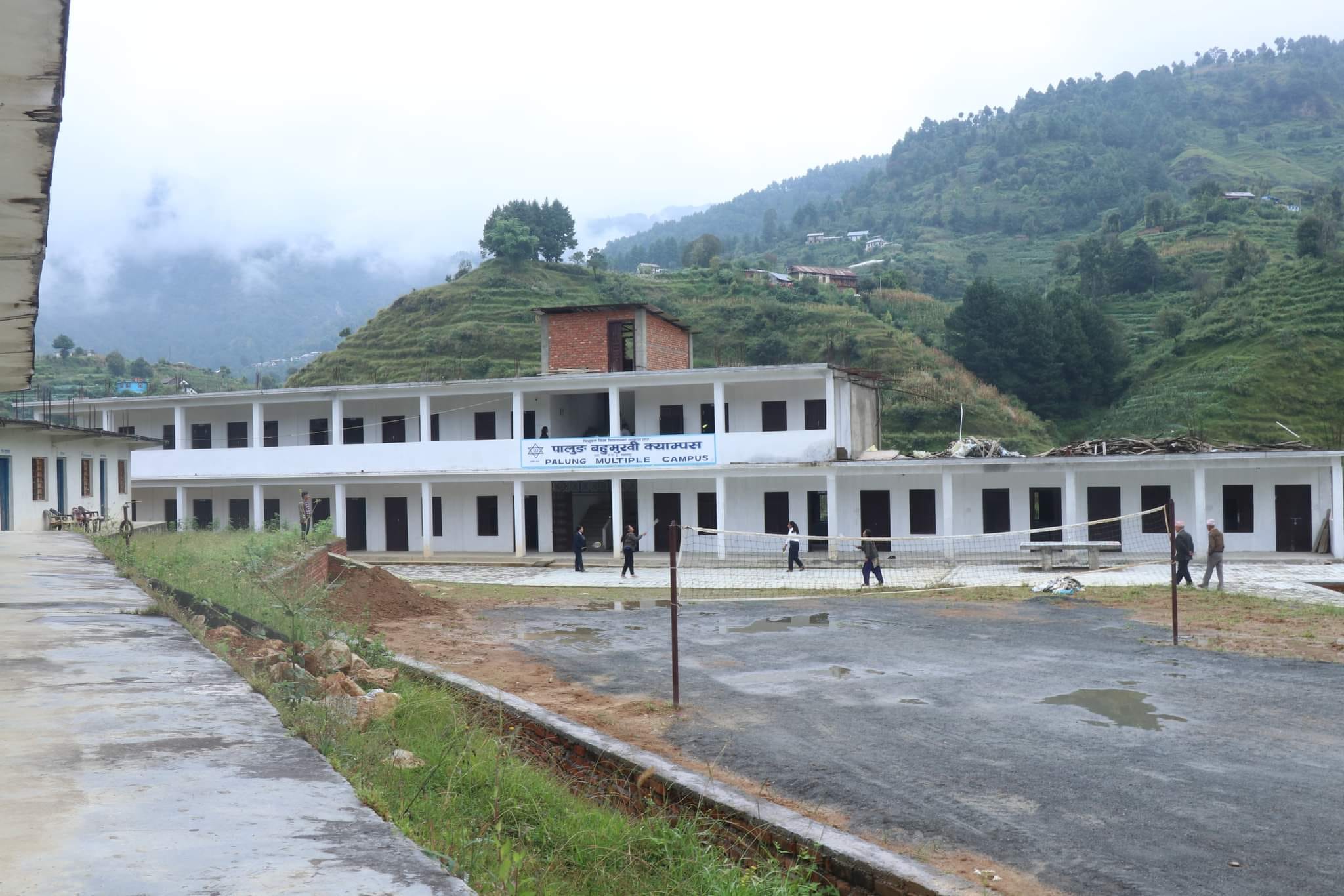
Message from the Campus Chief
Community campuses in Nepal, under the Nepal Public Campus Association, aim to expand equitable access to higher education for all classes, communities, and regions. Operating in all 77 districts, these campuses provide quality education to 30% of the nation's higher education students.
Our campus follows this mission by prioritizing collaboration, qualitative improvements, research, academic calendar development, and coordinated efforts among member institutions. As the central treasurer of the Association, I am committed to upholding the rights and interests of all community campuses and addressing their challenges through consistent advocacy.
Education Enhancement Plan
The core objective is to provide education aligned with the needs of the present era. This requires active participation and strategic planning from management, faculty, students, guardians, and stakeholders. The following actions will be undertaken:
Faculty Improvement
-
Teach the following university-prescribed methods
-
Participate in orientation programs as needed
-
Organize workshops, seminars, and writing support for academic development
-
Incorporate technology-friendly teaching (e.g., online projectors)
Student Development
-
Encourage timely enrollment and consistent attendance.
-
Ensure mandatory participation in unit exams, held monthly, quarterly, and annually.
-
Engage in environmental improvement activities
-
Promote inquisitiveness and dedication to study
-
Involve students in voluntary campus activities, such as maintaining cleanliness and planting trees.
-
Prioritize leadership, entrepreneurship, personality development, discipline, and motivational programs.
-
Make campus uniform and ID card compulsory.
-
Request the local education office for training budgets related to accounting and journalism (as per the Humanities Faculty syllabus)
Staff Advancement
-
Develop the capacity to work with technology
-
Collaborate with Thaha Municipality's education office for relevant training.
Guardians and Stakeholders
-
Conduct regular interactions and seminars with guardians on a tech-based educational approach.
-
Form subcommittees for campus development with representatives from the UGC, TU, banks, and other institutions
Faculty Association
The Nepal Public Campus Association has a unit on this campus. The management will address legitimate faculty concerns to promote a productive educational environment.
Student Union and Extra Activities
The student union will continue to support educational and extracurricular programs such as:
-
Quiz contests, speech competitions, debates, songs, poetry, and cultural events
-
Sports activities like volleyball, basketball, table tennis, races, and badminton
-
Intellectual games like chess
-
Educational observation tours
A welfare fund will be created under the student union’s name, managed through a joint account with the accountant.
Transportation Management
Due to the lack of public transport facilities, students have faced difficulty attending. The campus will coordinate with Janakalyan Technical School to ease transportation access.
Supplementary Classes
To help students prepare for exams and deepen their understanding, supplementary classes have been running for years. This year, it will be better organized with:
-
Online classes
-
Facebook groups based on academic levels
-
Use of projectors for enhanced delivery
Financial Reform Plan
Students are the primary source of funding. To strengthen the financial base:
-
Increase student enrollment
-
Secure higher educational grants from the municipality
-
Maximize operational grants from the University Grants Commission
-
Connect with donors and organizations for funding
-
Practice cost-effective spending
-
Lease or utilize campus-owned land for income generation (31 ropani in Kui Bhir and Damar)
Establishment of Endowment Fund
The current endowment of NPR 6.5 million will be raised to NPR 30 million through partnerships with local governments, donors, and private supporters.
Physical Development Plan
Short-term Plans:
-
Manage open space and develop green areas
-
Acquire laptops, computers, and projectors through institutional support
Long-term Plans:
-
Add four rooms to the current office building for a library and reading room
-
Construct a student hostel
-
Replace the old nine-room building and build boundary walls
-
Improve the seminar hall facilities
-
Build a vocational training building
-
Organize the student union room
-
Establish a well-equipped technical lab
Library and Reading Room Improvement
Changes to the syllabus and limited funding often hinder students' right to access textbooks and reference materials. To address this:
-
Identify donors to contribute books
-
Encourage graduates to donate textbooks and reference materials
-
Launch a “One Person, One Book” campaign
-
Build institutional partnerships for book donations
New Faculty Addition
Based on student demand and availability of higher secondary graduates in science, health, and education streams, the campus aims to:
-
Add Education and Science Faculties
-
Work closely with stakeholders to develop the required infrastructure
-
Advance new academic programs aligned with current needs and community benefits
Staff Provident Fund Management
Although legally required to allocate 10% to the Provident Fund, budget constraints have delayed contributions. Moving forward, contributions will be prioritized when funds are received from the municipality, UGC, or other institutions. This ensures that staff members receive full retirement benefits with respect and dignity, boosting staff morale and motivation.
Why Education Matters in Human Life
Education plays a vital role in shaping a person’s life. It helps us grow—not just physically, but also mentally, intellectually, spiritually, and socially. It builds our personality and guides us toward becoming complete, well-rounded human beings.
It’s through education that we learn how to face life’s challenges, seek peace and happiness, and rise above everyday struggles. Proper education empowers us to go beyond mere knowledge, action, or devotion—it brings us closer to lasting fulfillment.
The Deeper Power of Education
Education isn’t just about passing exams or getting a job. It teaches us values like truth, justice, integrity, and compassion. These qualities shape our character and help us live with purpose. It’s education that lifts us out of suffering and pushes us to act with courage, wisdom, and strength.
From ancient sages to contemporary thinkers, the world has advanced due to the lessons passed down through education. That legacy continues to influence and inspire us even now.
A Mother's First Lesson
A child’s education begins not in the classroom, but in the mother’s womb. Mothers are the first teachers in every human journey. That’s why education is much more than reading and writing—it’s the foundation for life itself.
We often hear the words "Shiksha" (education) and "Diksha" (moral guidance). Authentic learning means living those values. A truly educated person shows discipline, ethics, and humility in everyday actions. These qualities define what it means to be genuinely educated.
The Changing View of Education
Today, many people view skills solely in terms of the financial benefits they can provide. Society appears to focus more on the material aspects of life and less on the moral and spiritual aspects. This mindset has affected how students view higher education.
Instead of dreaming about gaining deep knowledge, many young people are now more focused on going abroad quickly, even if it means skipping higher studies in their home country. As a result, enrollment in higher education is decreasing across Nepal.
But we must not forget: education isn’t just a stepping stone to a job. It shapes how we think, act, and interact with the world. Even in foreign employment, there's a clear difference between someone who is educated and someone who isn’t. Educated workers often earn more and adapt better to challenges.
A Call for Policy Change
Given the importance of education for both personal and national development, there is a strong case for making at least a bachelor's degree a basic requirement through proper government planning and support. This wouldn’t just help individuals secure better opportunities, but also lead to a more capable and thoughtful society.
Courses Offered
Contact Palung Multiple Campus's administrative office for detailed information on the course, admissions, location, fees, scholarships, facilities, counseling or eligibility.
Contact Details
Palung Multiple Campus
Email Address: palungcampus22@gmail.com
Phone Number: +977-57-400069, +977-9841583081, +977-9855072368, +977-9849088012, +977-9861570818
Website: https://palungcampus.edu.np
Location: Thaha Municipality 3, Khelpudanda, Indrayani Chaur, Makawanpur, Bagmati Province, Nepal


